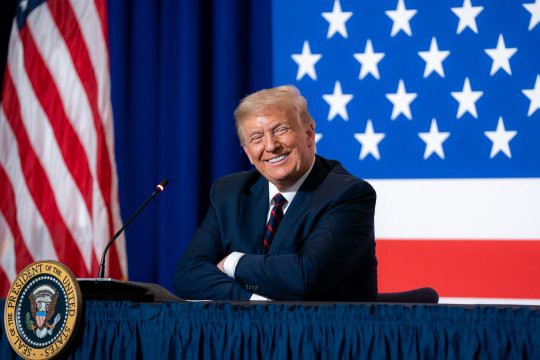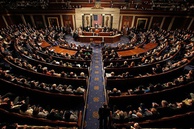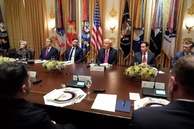American presidents have often declared their admiration for their predecessors. Barack Obama regularly mentioned Abraham Lincoln. Dwight Eisenhower revered George Washington. Andrew Jackson was well regarded by Franklin Roosevelt and his successor Harry Truman, who interpreted the Americans’ respect for Jackson as a need to expand the state apparatus, including for the purpose of helping the working class.
Donald Trump never mentioned Andrew Jackson during his first presidential campaign in 2016. It was not until after his election, which sent shock waves through the US political system, that he called himself his follower. Former New York City Mayor Rudy Giuliani likened Trump’s victory to Jackson’s, describing both as “establishment-beating people.” [1] Shortly after Trump’s inaugural address, his former senior adviser, Stephen K. Bannon, told reporters that the speech was “Jacksonian.” [2] During his first term, Trump hung Andrew Jackson’s portrait in the Oval Office right behind his desk, thus implicitly presenting himself as a modern-day Andrew Jackson, a people's president and the scourge of the Washington elite.
As the 45th President of the United States, Trump, celebrated the 250th birthday of America’s seventh President Andrew Jackson by visiting his former estate in Nashville. "Inspirational visit, I have to tell you. I’m a fan…They say my election was most similar to his," he said. [3] He also claimed to be committed to the ideology of Jacksonianism.
Some of Andrew Jackson’s biographers see striking parallels between him and Trump, not necessarily in the details, but in the larger picture: in their worldviews and actions. [4]
However, during his first term, Trump fell somewhat short of fully coming to par with his idol’s achievements. The lack of political experience and an unprecedented pushback by the Democratic Party had an effect. Trump arrived at the close of his first term in the White House with a completely different “baggage” and team. However, political experts are still wondering what Trump’s main political priorities will be. To understand why Trump reveres this particular president so much, and to predict Trump’s own activities, one needs to recall the main milestones and achievements of Andrew Jackson and understand what the ideology of Jacksonism means at this day and age.
Andrew Jackson in the pre-presidential period
The portrait of Andrew Jackson (1767-1845), who in the people’s mind symbolizes popular resistance to the power of financiers, is featured on the $20 bill. The current Democrats wanted to remove him from the banknote and replace him with an image of Harriet Tubman - a black female abolitionist, symbolizing the dignity of minorities. Then-President Trump did not let this happen.
During the Revolutionary War of 1775-1783, Andrew Jackson, then 13 years old, was already fighting the British as "a courier in the irregular troops." He was captured and, while in captivity, was mistreated by the British. When a British general ordered Jackson to polish his boots, Jackson, who was known for being bold and having a temper, told him to go to hell. This did not go over well. The British officer took out a blade and slashed Jackson, leaving a scar that would last the rest of his life. [5]
In peacetime, Jackson let off steam by getting into trouble. According to contemporary accounts, he was "the most roaring, rollicking, game-cocking, horse-racing, card-playing, mischievous fellow that ever lived in Salisbury." [6] He fought an estimated 103 duels, often after someone said something bad about his wife. His love of revenge and settling scores continued into his presidency.
According to Trump's biographers, his youth was reportedly marked by similar exploits: pulling girls' hair, throwing rocks at neighbors, almost pushing a classmate out of a second-story window, even hitting teachers. Trump got into trouble so regularly that his friends called detention "DT" (short for Donny Trump). [7] Trump himself admits in his memoir The Art of the Deal [8] that his main focus during his early years was "creating mischief."
Andrew Jackson later rose to the rank of major general, won the Battle of New Orleans during the War of 1812-1815, fought against various Indian tribes, and effectively conquered Florida. In 1824, on the strength of his wartime heroism, Jackson ran for president of the United States. By that time, the Federalist Party, hit by a crisis during the post-war period, had virtually ceased to exist and to influence political life. As a result, a one-party system was essentially established in the country with only the Democratic-Republican Party remaining. During the elections, the Republicans were represented by four independent candidates from the same party. One of Jackson's rivals was John Quincy Adams, who was then Secretary of State [9] in the Monroe administration and the author of the Monroe Doctrine - a policy of opposing European colonialism in the Americas. [10] Being the son of John Adams, the second president of the United States and one of the country’s Founding Fathers, he had first-hand knowledge of presidential duties.
However, during the election campaign, Andrew Jackson used the biography of his rival, Adams Jr., as proof that Adams was a corrupt insider who was out of touch with the people. Jackson argued that his own lack of experience in power proved that he could be a champion for the common man. However, the third US President, Thomas Jefferson, did not think much about Jackson's presidential aspirations: "He is one of the most unfit men I know for such a place." [11]
During the popular vote, Jackson received the largest number of votes and electors, but not a majority (it did not exceed 50 percent of the votes and electors), so the outcome of the presidential campaign was decided by a vote in the House of Representatives. The choice fell not on Jackson, allegedly due to collusion between the other two candidates. Supporters of Adams and another contender, Henry Clay, conspired to elect Adams president, and Adams appointed Clay his Secretary of State, which was tantamount to declaring him his successor.
Following his defeat, Jackson, like Trump two centuries later (after the 2020 vote), claimed that the election was rigged. Jackson and his supporters believed that the election had been stolen from him, calling it a "corrupt bargain." In response, an angry Jackson started building a new political coalition [12] to rally his supporters and run again in 1828.
The campaign became the dirtiest and most brutal the country had ever seen. News broke that Jackson's wife, Rachel, was in fact married to another man when she started sleeping with him decades earlier. Jackson was irate and decided to fight fire with all the embers of Hell: he accused Adams of living in sin, gambling, breaking the Sabbath, among other things. He also kept up the populist strategy from the previous election; one of his slogans was "Vote for Andrew Jackson who can fight, not John Quincy Adams who can write." [13] The election turned from disagreements over actual issues to bitter fights over personal lives.
Jackson's Democratic Party democratized the nomination process by allowing voters to directly participate in the selection process. It developed a strategy of using the media to reach out to large numbers of voters living far from one another.
This was a first in American history. In part, Jackson employed what today's leaders describe as a media strategy. He enlisted the nation's growing newspaper industry as a vehicle for getting his message out to the public.
Trump too attracted voters by using an innovative strategy of targeted (personalized) social media campaigning. Like Jackson 200 years ago, Trump has completely reshaped the Republican Party that supported him [14] as an institution, from top to bottom. His influence became evident during the Republican primaries, where candidates who shared Trump's views won and their opponents, the so-called "anti-Trumpers" and "dissenters," were sidelined.
Jackson personally helped promote news coverage and saw many editors as political advisers. He founded a loyal Washington newspaper and, for propaganda purposes, hired a staff artist who worked in a manner similar to that of modern-day White House photographers.
Jackson won a decisive victory with a program that was very clear to voters, aimed at freeing America from the dominance of bankers and manipulations of the corrupt political class during elections (Donald Trump had a similar program known as "drain the swamp.")
In 1833, Jackson was re-elected for a second term with a landslide winning 55 percent of voters against 37 percent and 219 electors against 49 for his opponent. The opponents accused him of populism though, just like they accused Trump 200 years later.
Jackson as President
The people. First off, in a bid to support his image of the people’s chosen one, Jackson introduced an open door policy in the White House. Any citizen could go inside and party with him. But things quickly got out of hand. At Jackson's inauguration, his supporters were so numerous that they emptied the White House breaking several thousand dollars' worth of porcelain alone and forcing the president to escape through a window. The crowd only left the building when booze was eventually moved to the White House lawn.
Similarly, Trump supporters damaged the Capitol building in January 2021 not because they wanted to destroy it, but because of poor crowd management by suspiciously sympathetic police. [15]
Personnel Policy. When selecting members of his administration, Jackson got rid of corrupt officials. He fired more civil servants (many of whom had served since the time of George Washington) than all of his predecessors combined, and appointed his closest friends and relatives. He also consulted with a group of informal advisers, which became known as his “Kitchen Cabinet.” This allowed Jackson to more effectively implement his program, as well as mobilize his supporters at all levels of government and integrate them into American politics.
Trump has also said that he wants to overhaul the bureaucracy, replacing experienced civil servants with political appointees loyal to himself. He promises to declare war on the Washington institutions and intends to govern America by expanding the powers of the presidency as much as possible.
Immigration Policy. In 1830, Andrew Jackson passed the Indian Removal Act. The idea was to divide up North America by moving the Indians west of the Mississippi River. The Cherokee tribe appealed to the Supreme Court, which ruled in their favor. Ignoring the decision (even though the judiciary is an equal branch of government), Jackson ordered the army to round up the Native Americans, have their property confiscated, and force them to march to Oklahoma amid the winter season. About 50 tribes were thus relocated, including the Cherokee. One in four Indians died along the way in the “Valley of Tears.” Jackson freed the eastern states from Indian tribes, giving their ancestral land to white farmers who turned it into slave plantations.
The expulsion of illegal immigrants was a focus of Trump’s election campaign. He plans to deport up to 20 million illegal immigrants from the United States and resume construction of the wall on the Mexican border, which was a central – though unimplemented – feature of Trump’s immigration policy during his first term. Trump plans to invoke the Alien Enemies Act of 1798, [16] which gives presidents the power to detain and deport non-citizens from “enemy countries” during wars and conflicts.
Financial policy. Andrew Jackson ran for re-election in 1828 with the slogan: "Either Jackson and no Bank, or the Bank and no Jackson." He regarded his re-election as a "people's mandate" for the final liquidation of the Bank of the United States [17], which he regarded as a feature of a political system that favored the rich and ignored "the humble members of society - farmers, mechanics, and laborers - who have neither the time nor the means to seek such privileges for themselves." [18] Jackson began to systematically implement his election program aimed at freeing America from the dominance of bankers. [19] Jackson vetoed the renewal of the Bank's charter, which Congress failed to override. As a result, "Jacksonism" triumphed. It was not until 80 years later that the US Federal Reserve System finally resumed operations and exists to this day. By the end of his presidency, Andrew Jackson had managed to completely eliminate the national debt. This was the first and only time in US history that the country was debt-free (today, the national debt exceeds $36 trillion, i.e. more than 120 percent of GDP). When asked before his death what exactly he considered his greatest achievement, Andrew Jackson answered without hesitation: "I killed the Bank."
Limiting the independence of the US Federal Reserve is likewise the centerpiece of Trump's economic program. The idea to exercise direct presidential control over the Federal Reserve policy is being mulled by Trump's team as part of a large-scale economic reform plan. [20] The bottom line is to grant the president the right to influence decisions regarding the key rate and, consequently, the emission of the dollar.
Trump pitched very similar ideas right ahead of his first presidential term, but the system proved stronger preventing him from achieving anything close to his stated goals, even in a confrontation with the Federal Reserve. Trump will hardly be able to bring the US national debt to zero (as Andrew Jackson did), but he has repeatedly stated that he wants to slow its growth or even partially restructure it. How radical Trump's approach will be during his "second presidential coming" will depend on many factors, primarily on the strength of the opposition from the liberal elites.
Tariff Policy. In 1832, South Carolina threatened [21] to leave the Union (USA) over controversial tariffs - high, protective duties on manufactured goods. They benefited the growing industries of the Northern states and were resisted by the South, whose economy was largely based on agriculture. South Carolina readied its local militia for possible military action by the federal government. Andrew Jackson responded to this by urging Congress to gradually reduce the tariffs, while threatening to use military force and leaving the door open for negotiations on new tariffs. Eventually an agreement was clinched, violence was avoided, and both sides saved face. At the same time, Jackson promoted US trade around the world by concluding bilateral (rather than multilateral) agreements.
As for Trump, he regards tariffs as a protectionist tool that can be used across the board to combat various negative factors adversely affecting the US economy, society, and national security. [22] Trump's economic program for his second term provides for [23] strengthening trade barriers to protect the US market, above all by introducing a 10-20 percent increase of tariffs on all imported goods. For some goods, the figure may be even higher: goods from China are planned to be subject to a duty of about 60 percent. [24] Imported automobiles may face a prohibitively high duty of 100 to 200 percent. Moreover, in his pre-election statements, Trump promised to impose a 100 percent tariff on goods imported from countries that refuse to use the US dollar. Higher tariffs may also impact trade with EU countries.
Foreign Policy. Andrew Jackson introduced the Monroe Doctrine, which then meant that European powers should refrain from colonizing the Americas and that the United States would not interfere in European affairs. Half a century later, the United States violated this isolationist principle itself, effectively colonizing Latin America without European competition.
Jackson's foreign policy focused on expanding trade opportunities for US commerce. [25] His administration negotiated a trade agreement with Great Britain – something his predecessors had failed to achieve. He increased funding for the Navy using it to protect US political and commercial interests in faraway regions.
A second major focus of President Jackson’s foreign policy was the settlement of various grievances by force. [26] However, when Texas rebelled against Mexico and its people asked the United States to annex the territory, Jackson avoided giving a direct answer.
US foreign policy during Donald Trump’s presidency was characterized by unpredictability and a rejection of the country’s previous international commitments. [27] Trump prioritized bilateral relations over multilateral agreements and adhered to the principles of isolationism and protectionism. For Trump, intimidation of enemies is as important for international relations as it is for doing business. While his predecessors sought to develop rules with their economic partners and then impose them on China, Trump does not care about international rules, as long as the US is able to conquer new markets. At the same time, Trump prides himself on being the only US president in the past 72 years who has not started a single war. This means that Washington may offer Russia and China a grand deal on the division of spheres of influence.
***
Therefore, Donald Trump's approach to both domestic and foreign policy is consistent with the tradition of Jacksonian ideology. Jacksonians do not fit into either the liberal or conservative camps; they are the "radical middle." Jacksonianism is characterized by an emphatic anti-elitism and egalitarian policies. [28] Domestically, this translates into a tough fight against crime and a staunch adherence to traditional views on societal problems. In foreign policy, this prescribes avoiding multilateralism or messianic promotion of world order, assuming instead that the United States should focus exclusively on the real national interest of "America First!" In other words, Washington’s foreign policy initiatives should focus entirely on advancing US interests while ignoring all other distracting or competing factors, such as "liberal values," "norms," "humanitarian considerations," "nation-building," etc. Jacksonism does not exclude the use of force as long as it is based on a strategy that benefits American interests.
The views of the author are his own and may not reflect the position of the Editorial board.
[1] https://eng-news.ru/Is-Donald-Trump-the-modern-day-Andrew-Jackson/
[2] https://www.breitbart.com/politics/2017/01/20/virgil-age-lion-donald-trump-puts-america-first/
[3] https://www.washingtonpost.com/politics/trump-cites-andrew-jackson-as-his-hero--and-a-reflection-of-himself/2017/03/15/4da8dc8c-0995-11e7-a15f-a58d4a988474_story.html
[4] https://archive.nytimes.com/www.nytimes.com/2017/03/15/us/politics/donald-trump-andrew-jackson.html
[5] https://www.kqed.org/pop/62290/what-we-can-learn-about-trump-from-his-favorite-president-andrew-jackson
[7] https://www.washingtonpost.com/lifestyle/style/young-donald-trump-military-school/2016/06/22/f0b3b164-317c-11e6-8758-d58e76e11b12_story.html
[8] https://avalonlibrary.net/ebooks/Donald%20J.%20Trump%20-%20Trump%20-%20The%20Art%20of%20the%20Deal.pdf
[9] John Quincy Adams was experienced in diplomatic service abroad: in 1809- 1814 he served as US ambassador to Russia, was friends with Finance Minister Dmitry Guryev, Chancellor Nikolai Rumyantsev, and even Emperor Alexander I, with whom he went out for daily walks during which the two engaged in lengthy conversations, including in Russian, which Adams had managed to master during his stint.
[10] https://interaffairs.ru/news/show/36003
[11] https://www.thegospelcoalition.org/blogs/evangelical-history/andrew-jackson-the-forerunner-of-donald-trump/
[12] During the 1830s Andrew Jackson’s coalition transformed into the Democratic Party, while the Democratic-Republican Party became the Republican Party.
[14] https://www.theatlantic.com/podcasts/archive/2024/07/trumps-wholesale-renovation-of-the-republican-party/679074/
[15] https://www.theepochtimes.com/opinion/cinema-documentary-review-the-real-story-of-january-6-4643382
[16] https://www.newsnationnow.com/politics/2024-election/what-alien-enemies-act-1798/
[17] The so-called Second Bank of the United States that existed between 1818 and 1836 was actually the country’s central bank (analogous to the modern Federal Reserve System – a project of European bankers, above all the Rothschilds). The Bank secured a 20-year Congressional license in 1816, and acted as a financial lender for the US government. This led to a quick growth of the state debt. President Jackson initiated the process of revoking the Second Bank’s license.
[18] https://thesocialleader.com/2013/04/andrew-jackson-bank-1/
[19] https://www.yahoo.com/news/why-trump-federal-could-clash-222919082.html
[20] https://www.wsj.com/economy/central-banking/trump-allies-federal-reserve-independence-54423c2f
[21] https://archive.org/details/preludetocivilwa0000free/page/n3/mode/2up
[22] After becoming president in 2017, Trump's first act was to sign an executive order withdrawing the United States from the Trans-Pacific Partnership (TPP). He soon also broke off trade negotiations with the EU to create the Transatlantic Trade and Investment Partnership (TTIP) (essentially free movement of goods from Asia and Europe, which is disadvantageous for US producers). In order to revive the American economy, Trump often used tariff policy tools during his first presidential term. Thus, he stopped imports of steel and aluminum from China, Canada, the EU, and Russia to breathe life into the steel industry in the northern United States; he introduced protective duties on thousands of goods from China (total value - $200 billion).
[23] https://www.theguardian.com/us-news/2024/nov/26/trump-tariff-threat-worldwide-response
[24] https://www.bloomberg.com/news/articles/2024-11-25/trump-vows-to-hit-china-mexico-canada-with-tariffs-over-border
[25] https://books.google.ru/books?id=uTvRCwAAQBAJ&pg=PA381&redir_esc=y#v=onepage&q&f=false
[26] When France stopped paying some of its US debts, Jackson ordered the seizure of property belonging to French citizens in the United States, thereby forcing a settlement. The State Department also settled smaller claims against Denmark, Portugal, and Spain.
[27] As part of its “America First” policy, the Trump administration has reneged on many of the United States’ previous international commitments, including withdrawing from the Intermediate-Range Nuclear Forces Treaty, the UN Human Rights Council, UNESCO, the Paris Climate Agreement, and others. By using political and economic pressure, the United States has often balanced on the brink of war with most of its adversaries.
read more in our Telegram-channel https://t.me/The_International_Affairs

 14:10 06.01.2025 •
14:10 06.01.2025 •



























